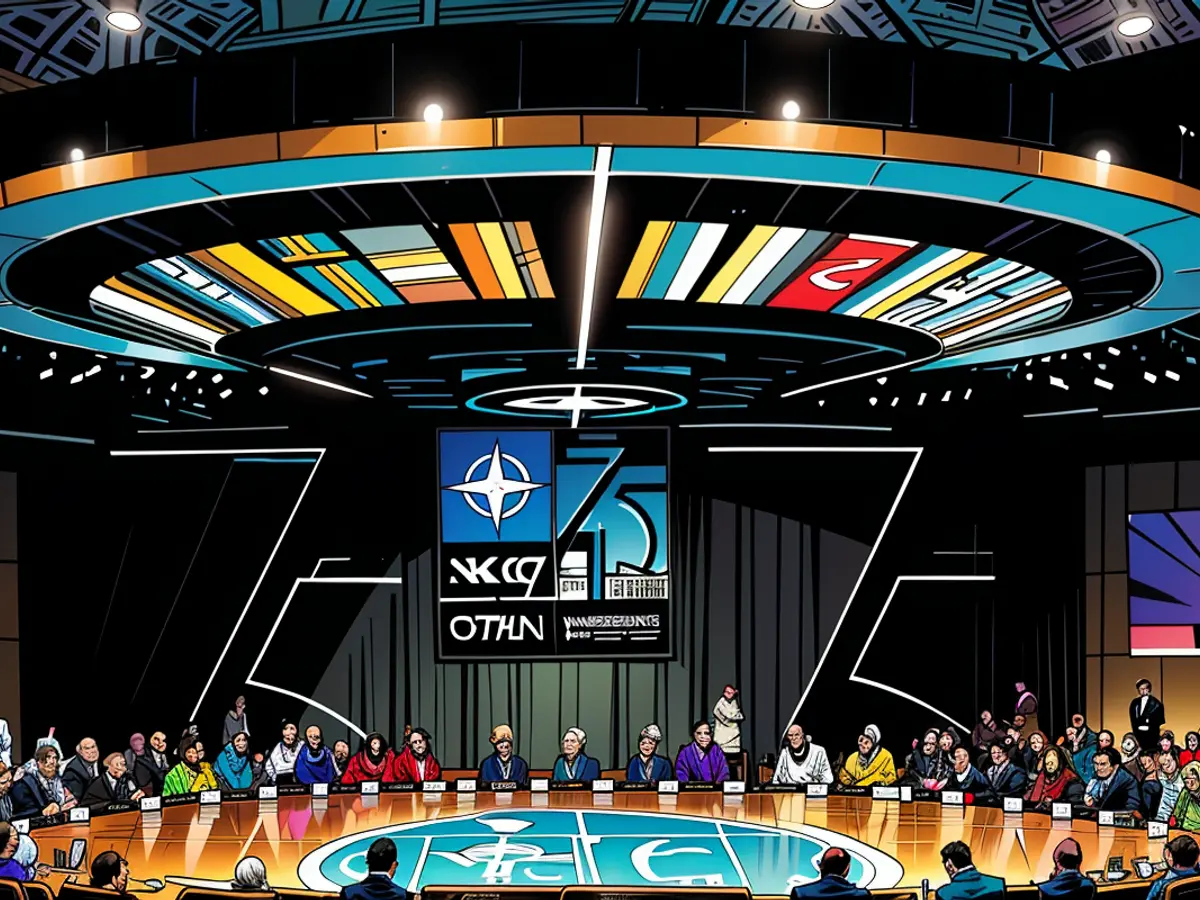Defense - Nato is preparing for dark times
The Nato is preparing for darker times in its 75th year of existence. A new Cold War with Russia, an escalation of tensions with China? The 32 Allies are now taking precautions at their jubilee summit in Washington. The Alliance is demonstrating solidarity with Ukraine by making new political and military commitments in response to Russia's aggression against its neighbor.
The Ukrainian President Volodymyr Zelenskyy will meet today with heads of state and government on the third and final summit day, as well as representatives from Indo-Pacific countries, who, like the Nato, have concerns about China's course.
The basis for the talks is what was decided on Wednesday:
Ukraine Command in Wiesbaden
The Nato will coordinate weapons deliveries and training activities for the Ukrainian armed forces from Wiesbaden in the future. The heads of state and government of the member states have decided at the summit to launch this operation, which is expected to begin on Friday and gradually take over tasks previously performed by the USA.
The Nato project also serves as a precaution for the possible return of Donald Trump to the US Presidency in January 2025. Trump's Republican Party statements in the past have raised doubts about whether the USA would continue to support Ukraine in its defensive war against Russia under his leadership. The Alliance expects that a political course change in Washington could also affect the coordination of weapons deliveries and training activities for the Ukrainian armed forces.
A Special Envoy and a Lot of Money for Weapons
In the summit declaration, Ukraine is assured that it will receive military aid worth at least 40 billion Euros within the next year. This is roughly the same amount that was mobilized in the previous year. This promise does not meet the long-term commitment that the outgoing Nato Secretary-General Jens Stoltenberg originally demanded. For Ukraine, it is better than nothing. The Ukraine package also includes the decision to send a senior Nato representative to Ukraine.
The Path to Nato Membership is Now "Irreversible"
There is a compromise on the contentious issue of Nato membership perspective. The Alliance also assures Ukraine that it will no longer be stopped on its way into the defensive alliance. In the final declaration, the path to membership is described as irreversible. At the same time, it is emphasized that a formal invitation to membership can only be spoken at a later date when all allies agree and all accession conditions are met. This includes reforms in the areas of democracy and the economy, as well as the security sector.
Defense against Cyber Threats from China and Russia
To better equip the Nato against hacking attacks or disinformation campaigns, a new Integrated Cyber Defense Centre is being built. It is intended to contribute to the improvement of network security and the situation awareness.
Nato Toughens its Stance against China
In the summit declaration, Nato accuses China of providing significant support for Russia's war against Ukraine. As examples, the extensive support China provides to the Russian defense industry and the so-called boundaryless partnership between the two countries are cited.
At the same time, the Chinese government in Beijing is being warned. China cannot permit the largest war in Europe's recent history without negative consequences for its interests and reputation, according to the statement. The increasingly close strategic partnership between Russia and China and their mutually reinforcing efforts to undermine and redefine the rule-based international order are causing great concern.
What else?
The United States announced on Wednesday that, for the first time since the Cold War, they will station weapons systems in Germany that can reach Russia. From 2026 onwards, Tomahawk cruise missiles with a range of more than 2000 kilometers, SM-6 missile defense systems, and new supersonic weapons will provide better protection for NATO allies in Europe.
Moreover, F-16 fighter jets promised by foreign partners are expected to be deployed in Ukraine this summer to counter the Russian offensive war. The transfer of the Jets is already underway, according to the US, the Netherlands, and Denmark.
NATO Summit Website https://www.nato.int/cps/en/natohq/topics_111268.htm
- During the NATO summit, the Alliance expressed concern about the potential for a new Cold War with Russia and increased tensions with China.
- Ukraine, a neighbor of Russia, has faced aggression from its northern neighbor, leading NATO to make new political and military commitments to support the Ukrainian government.
- The Ukrainian President Volodymyr Zelenskyy will meet with leaders from NATO countries and Indo-Pacific nations concerned about China's geopolitical moves.
- NATO has decided to coordinate weapons deliveries and training activities for the Ukrainian armed forces from Wiesbaden, Germany, a move aimed at strengthening Ukraine's defense capabilities against Russia.
- Donald Trump, a potential future US President, has raised doubts about US support for Ukraine in the event of a Russian conflict, worrying NATO members.
- Germany and the United States of America have agreed to station weapons systems in Germany capable of reaching Russia, a move meant to strengthen NATO's defense in Europe.
- As a response to China's support for Russia's war against Ukraine, NATO criticized Beijing in the summit declaration and warned of the consequences of undermining the international order.
- NATO members are anticipating the deployment of F-16 fighter jets to Ukraine this summer to counter Russian aggression, with the US, the Netherlands, and Denmark leading this military aid effort.








